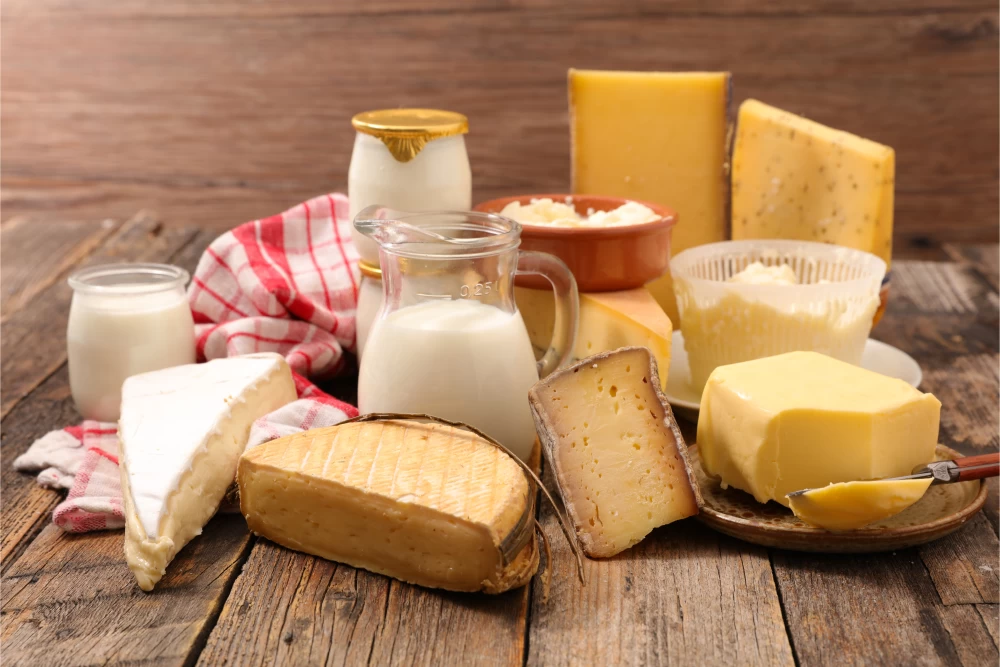
- 23rd March 2023
Table of Contents
Fatty Liver and Dairy
Consuming dairy products in moderation may not be harmful, but overindulging in them can cause several health issues. One of the most concerning problems is fatty liver disease, which affects millions of people worldwide. A diet high in saturated fat, refined carbohydrates and sugar has been linked to non-alcoholic fatty liver disease (NAFLD), which is becoming increasingly prevalent. In a study published by the Journal of Hepatology, researchers found that consuming more than two servings of dairy per day was associated with an increased risk for NAFLD. The study also revealed that individuals who consumed low-fat dairy had a lower risk compared to those who consumed full-fat dairy products. This indicates that choosing low-fat options can help reduce the risk of developing NAFLD. It's important to note that not all dairy products are created equal. For example, cheese and butter have a higher fat content than milk or yogurt. Therefore, it's crucial to read nutrition labels and choose low-fat options when possible. Additionally, incorporating other healthy foods into your diet such as fruits, vegetables and whole grains can further reduce your risk for fatty liver disease while still enjoying moderate amounts of dairy products.
What is Fatty Liver?
Fatty liver, also known as hepatic steatosis, is a condition characterized by the accumulation of excess fat in the liver cells. While having some fat in the liver is normal, when it exceeds 5-10% of the organ's weight, it can lead to inflammation and damage over time. Fatty liver disease commonly occurs in people who consume excessive amounts of alcohol (alcoholic fatty liver disease) or have metabolic disorders such as obesity and diabetes (non-alcoholic fatty liver disease). Dairy products are often scrutinized for their impact on fatty liver disease due to their high saturated fat content. However, research on this topic has been inconsistent. On one hand, some studies suggest that consuming dairy products may help reduce the risk of non-alcoholic fatty liver disease due to their calcium and vitamin D content. On the other hand, other research indicates that diets high in saturated fats like those found in dairy products may contribute to fatty liver disease development or exacerbate existing conditions. As with any dietary concern related to health issues such as fatty liver disease, it’s important to consult with a healthcare professional before making significant changes to your diet.
Is Dairy Healthy for People with Fatty Liver Disease?
Studies have shown that fatty liver disease affects approximately 25% of the global population. This is a potentially serious condition that occurs when fat accumulates in the liver, leading to inflammation and damage to liver cells. While there are various factors that can contribute to fatty liver disease, including obesity, diabetes, and alcohol consumption, diet also plays an important role. When it comes to dairy products and fatty liver disease, there is some debate among experts. On one hand, dairy contains essential nutrients like calcium and vitamin D that are important for overall health. However, dairy products are also high in saturated fat which has been linked to an increased risk of developing fatty liver disease. If you have been diagnosed with fatty liver disease or are concerned about your risk of developing this condition, it may be worth consulting with a healthcare professional or registered dietitian who can help you determine the best dietary choices for your individual needs. Limiting your intake of high-fat dairy products while ensuring adequate calcium and vitamin D intake through other sources may be recommended as part of an overall healthy diet plan.
Benefits of Dairy for People with Fatty Liver Disease
Dairy products are an excellent source of protein, calcium, and vitamin D. Additionally, studies have shown that consuming dairy products can help improve liver function in people with fatty liver disease. Fatty liver disease occurs when excess fat accumulates in the liver cells, leading to inflammation and damage to the liver tissue. The benefits of dairy for people with fatty liver disease are two-fold. Firstly, it may help reduce the amount of fat stored in the liver. Secondly, it may also reduce inflammation caused by the accumulation of fat in the liver cells. This is because dairy products contain essential nutrients such as phosphorus and calcium that can aid in reducing inflammation. Additionally, consuming low-fat dairy products has been linked to a reduced risk of developing non-alcoholic fatty liver disease (NAFLD). NAFLD is a condition similar to fatty liver disease but occurs even without alcohol consumption. Therefore, incorporating dairy products into your diet can be helpful not only for those who already have fatty liver disease but also as a preventative measure against NAFLD.

Risks of Dairy for People with Fatty Liver Disease
Individuals with fatty liver disease often experience inflammation and damage to their liver cells, leading to an increased risk of liver-related complications. While dairy products are generally considered healthy foods, some individuals with the condition may need to be cautious when consuming them. This is because they contain high amounts of saturated fats that can worsen the symptoms of fatty liver. One study found that regular consumption of whole milk and other high-fat dairy products was associated with a higher risk of developing non-alcoholic fatty liver disease (NAFLD). Additionally, excessive intake of dairy products has been linked to insulin resistance, which can lead to the accumulation of fat in the liver. As such, it is recommended that people with fatty liver disease limit their intake of high-fat dairy products and opt for low-fat or non-dairy alternatives instead. Overall, while dairy products can provide important nutrients like calcium and protein, individuals with fatty liver disease should be mindful about their consumption due to their potential negative impact on symptoms. By making changes to their diet and lifestyle choices, they may be able to reduce the risks associated with this condition and improve their overall health outcomes over time.
Tips for Maintaining a Healthy Diet
Maintaining a healthy diet is crucial to preventing and managing various health conditions, including fatty liver disease. One of the essential tips for a healthy diet is consuming more vegetables, fruits, whole grains, lean proteins, and healthy fats instead of processed foods and sugary beverages. These nutrient-dense foods are rich in vitamins, minerals, fiber, and antioxidants that can promote liver health by reducing inflammation and oxidative stress. Another tip for maintaining a healthy diet when dealing with fatty liver disease is limiting or avoiding dairy products. Although dairy can be an excellent source of calcium and protein, it may also contain high amounts of saturated fat that can contribute to fat accumulation in the liver. Moreover, some people may have lactose intolerance or milk allergy that could worsen their fatty liver symptoms. Instead of dairy products, you can opt for plant-based milk alternatives like almond milk or soy milk or try low-fat yogurt or cheese in moderation. In conclusion, making small dietary changes such as incorporating more whole foods and reducing dairy intake can go a long way in promoting overall health and managing fatty liver disease effectively. Always consult your healthcare provider if you have any concerns about your diet or underlying medical conditions.
Conclusion: Considerations for Dairy and Fatty Liver
In conclusion, if you have fatty liver disease, it may be worth considering reducing your intake of full-fat dairy products. Saturated fats found in these products can contribute to the buildup of fat in the liver and worsen symptoms. However, this does not mean you need to eliminate dairy completely from your diet. Instead, opt for low-fat or nonfat dairy options such as skim milk, low-fat yogurt, and reduced fat cheese. These alternatives are still a good source of protein and calcium without the added saturated fats that come with full-fat dairy products. Additionally, incorporating more plant-based foods into your diet can also help improve symptoms of fatty liver disease. Foods such as fruits, vegetables, whole grains and legumes are rich in nutrients that support liver health and reduce inflammation. Overall, making small changes to your diet can make a big impact on managing fatty liver disease.














